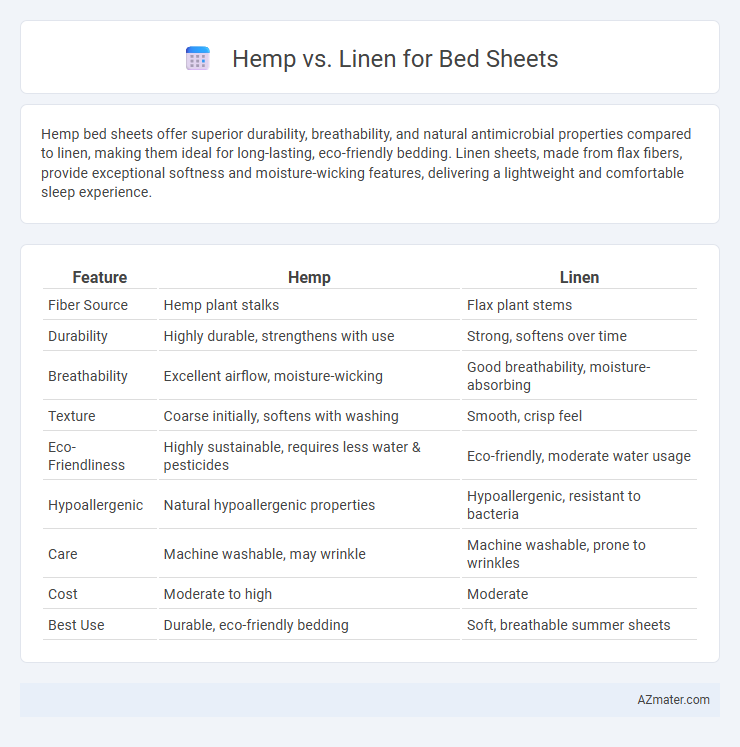Hemp bed sheets offer superior durability, breathability, and natural antimicrobial properties compared to linen, making them ideal for long-lasting, eco-friendly bedding. Linen sheets, made from flax fibers, provide exceptional softness and moisture-wicking features, delivering a lightweight and comfortable sleep experience.
Table of Comparison
| Feature | Hemp | Linen |
|---|---|---|
| Fiber Source | Hemp plant stalks | Flax plant stems |
| Durability | Highly durable, strengthens with use | Strong, softens over time |
| Breathability | Excellent airflow, moisture-wicking | Good breathability, moisture-absorbing |
| Texture | Coarse initially, softens with washing | Smooth, crisp feel |
| Eco-Friendliness | Highly sustainable, requires less water & pesticides | Eco-friendly, moderate water usage |
| Hypoallergenic | Natural hypoallergenic properties | Hypoallergenic, resistant to bacteria |
| Care | Machine washable, may wrinkle | Machine washable, prone to wrinkles |
| Cost | Moderate to high | Moderate |
| Best Use | Durable, eco-friendly bedding | Soft, breathable summer sheets |
Introduction: Comparing Hemp and Linen Bed Sheets
Hemp and linen bed sheets are natural, eco-friendly textiles prized for their durability and breathability. Hemp fibers offer superior strength and resistance to wear, making them ideal for long-lasting bedding, while linen, derived from flax plants, provides a softer texture and excellent moisture-wicking properties. Both materials promote hypoallergenic and antimicrobial benefits, catering to sustainable and health-conscious sleep environments.
Overview of Hemp and Linen Fabrics
Hemp fabric, derived from the fibers of the Cannabis sativa plant, is known for its remarkable durability, moisture-wicking properties, and natural resistance to mold and UV rays. Linen, crafted from the flax plant fibers, offers exceptional breathability, softness, and a lightweight feel, making it ideal for warm climates. Both fabrics are eco-friendly, biodegradable, and highly breathable, but hemp tends to be stronger and more resistant to wear compared to the finer, smoother texture of linen.
Sustainability and Environmental Impact
Hemp bed sheets boast exceptional sustainability due to the plant's rapid growth, requiring minimal water and no pesticides, significantly reducing environmental impact compared to traditional crops. Linen, derived from flax, is also eco-friendly but demands more intensive water usage and slower cultivation periods. Both fibers offer biodegradable and durable options, yet hemp's superior resource efficiency makes it the greener choice for sustainable bedding.
Comfort and Breathability Differences
Hemp bed sheets offer superior breathability due to their moisture-wicking properties, making them ideal for hot sleepers seeking comfort. Linen sheets, derived from flax fibers, provide a softer feel that improves with each wash, enhancing overall comfort over time. Both fabrics allow excellent airflow, but hemp tends to be more durable and resistant to bacteria, promoting a fresher sleep environment.
Durability and Longevity
Hemp bed sheets are known for their exceptional durability, often lasting 20 to 30 years due to their strong fibers resistant to wear and tear. Linen, derived from flax, offers a comparable lifespan of approximately 10 to 15 years, with a slightly softer texture that becomes more comfortable over time. Both materials provide breathable, moisture-wicking properties, but hemp's superior tensile strength makes it the preferred choice for long-lasting, resilient bedding.
Softness and Fabric Texture
Hemp bed sheets offer a unique combination of durability and a slightly coarse texture that softens with each wash, making them increasingly comfortable over time. Linen sheets, crafted from flax fibers, provide a naturally smooth and breathable fabric that feels luxuriously soft against the skin from the first use. While hemp fabric starts rougher, its strength and enhanced softness after repeated laundering contrast with linen's instant silky texture and airy quality, making both excellent choices depending on personal softness preference.
Moisture-Wicking and Temperature Regulation
Hemp bed sheets excel in moisture-wicking due to their highly breathable fibers that efficiently absorb and release moisture, keeping sleepers dry throughout the night. Linen, made from flax fibers, offers superior temperature regulation by promoting airflow and preventing heat retention, making it ideal for warmer climates. Both materials provide natural cooling properties, but hemp's durability and enhanced moisture management make it a top choice for sweat-prone sleepers.
Allergen Resistance and Hypoallergenic Qualities
Hemp bed sheets exhibit exceptional allergen resistance due to their natural antimicrobial properties, effectively repelling dust mites and mold, making them highly suitable for sensitive skin. Linen, derived from flax fibers, is also hypoallergenic and breathable but may retain more moisture, potentially attracting allergens in humid environments. Choosing hemp sheets offers superior hypoallergenic benefits, especially for individuals prone to allergies and respiratory issues.
Care, Maintenance, and Aging
Hemp bed sheets require minimal care, becoming softer and more durable with each wash due to their strong fibers and resistance to wear. Linen sheets also improve with age, developing a natural softness and breathable texture but may require gentle washing to maintain fiber integrity and prevent fraying. Both materials are highly sustainable, with hemp offering superior mildew resistance and linen demanding more delicate maintenance to preserve its longevity and appearance.
Price Comparison and Value for Money
Hemp bed sheets generally cost more upfront compared to linen, with prices ranging from $80 to $150 for quality options, while linen sheets typically fall between $60 and $120. Despite higher initial costs, hemp offers superior durability, becoming softer with each wash, which increases its overall value for money by lasting longer than linen. Linen sheets provide good breathability and comfort at a lower price point, making them a cost-effective option for those prioritizing budget over long-term durability.

Infographic: Hemp vs Linen for Bed Sheet
 azmater.com
azmater.com